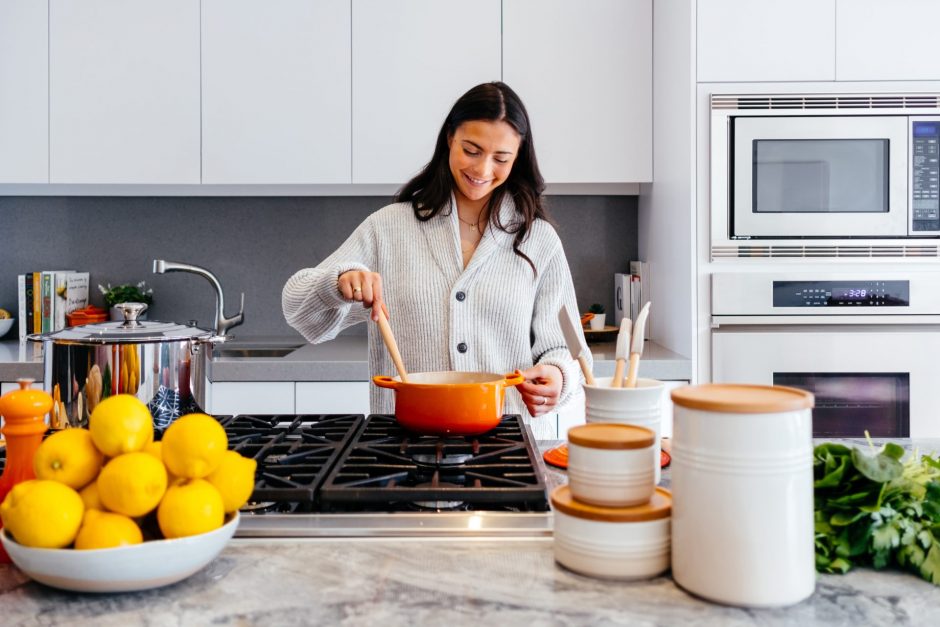Recently, there has been a rise in the number of sustainable budget-friendly fashion options, green car models and even eco-conscious home building and remodel materials. While this signals a giant step forward in society’s bid to better protect our resources, you can also make an impact by practicing sustainable habits in one very important room of the home: your kitchen. Each year, families toss out $1,500 worth of food, while kitchen appliances like microwaves and coffee makers contribute to over $250 of wasted electricity annually. If you are looking to embrace a sustainable lifestyle, the kitchen is the best place to start and as a bonus, it comes with additional perks. Embracing sustainability in the kitchen can save you money and help you take control of your health — all while doing your part to preserve the future of our planet.

Fill Your Freezer With Meal Prep
If you want to cut down the amount of food you get rid of each week, try meal prepping. One common reason for food waste cited by families is the spoilage of ingredients or the additional effort it takes to prepare fresh meals each day. As a result, many of us turn to prepackaged ingredients and meals that are well wrapped in plastic while still wasting the food in our refrigerators.
Spending a few hours each week to bulk cook and portion out freezable meals can drastically cut your dining out bill, reduce food wastage and make mealtimes much easier, especially if you’re busy during the week. It is also a useful trick that encourages you to take homemade lunches — a trick that can help your office eliminate single-use packaging and be a little more eco-conscious at work as well.
Buy Fresh, Unpackaged Produce
Switch up your shopping habits and opt for fresh, loose produce instead. Too often, consumers reach for prepackaged vegetables, fruits, salads or meats which in the end comes wrapped in plastic and non-biodegradable packaging. It also comes with a higher price tag, to compensate for the convenience of it.
Buying fresh unpackaged produce allows you to buy what you need (minimizing food waste), eliminate packaging and only require a few minutes to prepare it for the week ahead. Get yourself some glass containers and spend some time in the kitchen dicing up your fruit and vegetables for the week. This way it’s easy to grab and use and if you are worried about life dates, pop them into your freezer until needed.
Switch Or Make Your Own Cleaning Solutions
Each year, we spend over $50 on cleaning products which tend to be filled with harsh chemicals and are not great for their environment (or your health in some instances). Instead, swap your kitchen cleaner for a sustainable alternative when you are next shopping. You can also opt to make your own all-natural kitchen cleaner using pantry staples such as baking soda, white vinegar and citrus juice/peels for fragrance.
Reuse Your Containers
While we are on the topic of meal prep, consider your food storage containers. Reuse glass containers from store-bought produce for other purposes instead of putting them in the trash. Glass containers from pasta sauces or pickled vegetables can be cleaned and reused in the kitchen to store dried pasta or even store your own homemade pasta and vegetable sauce (hello meal prep).
If you are worried about aesthetics, a simple browse of Pinterest can provide endless easy DIY kitchen storage decor ideas. Alternatively, you can opt to shop at a waste-free supermarket where you take your own containers. Another idea is to reuse spice jars and opt for refill packs when they run out.
Finally, pick yourself up a meal planning list the next time you are out shopping and attach it to the front of your refrigerator. The refrigerator is one of the most used kitchen appliances in your home so it is an ideal place to leave reminders about needed food items and limit duplicate or mindless purchasing.
If you want to go further, you can also think about purchasing kitchen equipment such as cutting boards that are made sustainable materials. The list is endless but the impact is wide-ranging. If you want to live a more mindful and ecofriendly life, start with your kitchen.
Read More:
4 ways to make your kitchen more environmentally friendly
How to improve air quality in your home
Some of the top ways you can be more eco-friendly
How to keep a toxin free and healthy environment in your home

